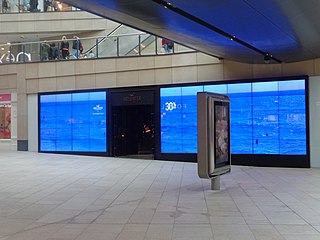
Marketing is the act of satisfying and retaining customers. It is one of the primary components of business management and commerce.

Sales are activities related to selling or the number of goods sold in a given targeted time period. The delivery of a service for a cost is also considered a sale. A period during which goods are sold for a reduced price may also be referred to as a "sale".

Telemarketing is a method of direct marketing in which a salesperson solicits prospective customers to buy products, subscriptions or services, either over the phone or through a subsequent face to face or web conferencing appointment scheduled during the call. Telemarketing can also include recorded sales pitches programmed to be played over the phone via automatic dialing.
Sales promotion is one of the elements of the promotional mix. The primary elements in the promotional mix are advertising, personal selling, direct marketing and publicity/public relations. Sales promotion uses both media and non-media marketing communications for a predetermined, limited time to increase consumer demand, stimulate market demand or improve product availability. Examples include contests, coupons, freebies, loss leaders, point of purchase displays, premiums, prizes, product samples, and rebates.
Bait-and-switch is a form of fraud used in retail sales but also employed in other contexts. First, customers are "baited" by merchants' advertising products or services at a low price, but then, when they visit the store, those customers discover that the advertised goods are not available and are pressured by salespeople to purchase similar but higher-priced products ("switching").

An estate agent is a person or business that arranges the selling, renting, or managing of properties and other buildings. An agent that specialises in renting is often called a letting or management agent. Estate agents are mainly engaged in the marketing of property available for sale and contract reassignments, and a solicitor or licensed conveyancer is used to prepare the legal documents. In Scotland, however, many solicitors also act as estate agents, a practice that is rare in England and Wales.
In marketing, promotion refers to any type of marketing communication used to inform target audiences of the relative merits of a product, service, brand or issue, persuasively. It helps marketers to create a distinctive place in customers' mind, it can be either a cognitive or emotional route. The aim of promotion is to increase brand awareness, create interest, generate sales or create brand loyalty. It is one of the basic elements of the market mix, which includes the four Ps, i.e., product, price, place, and promotion.

An advertising campaign is a series of advertisement messages that share a single idea and theme which make up an integrated marketing communication (IMC). An IMC is a platform in which a group of people can group their ideas, beliefs, and concepts into one large media base. Advertising campaigns utilize diverse media channels over a particular time frame and target identified audiences.
A film distributor is responsible for the marketing of a film. The distribution company may be the same with, or different from, the production company. Distribution deals are an important part of financing a film.
Social marketing is a marketing approach which focuses on influencing behavior with the primary goal of achieving "common good". It utilizes the elements of commercial marketing and applies them to social concepts. However, to see social marketing as only the use of standard commercial marketing practices to achieve non-commercial goals is an oversimplified view. Social marketing has existed for some time, but has only started becoming a common term in recent decades. It was originally done using newspapers and billboards and has adapted to the modern world in many of the same ways commercial marketing has. The most common use of social marketing in today's society is through social media.

The Association of the British Pharmaceutical Industry (ABPI) is the trade association for over 120 companies in the UK producing prescription medicines for humans, founded in 1891. It is the British equivalent of America's PhRMA; however, the member companies research, develop, manufacture and supply medicines prescribed for the National Health Service.

Food marketing is the marketing of food products. It brings together the food producer and the consumer through a chain of marketing activities.
A market analysis studies the attractiveness and the dynamics of a special market within a special industry. It is part of the industry analysis and thus in turn of the global environmental analysis. Through all of these analyses the strengths, weaknesses, opportunities and threats (SWOT) of a company can be identified. Finally, with the help of a SWOT analysis, adequate business strategies of a company will be defined. The market analysis is also known as a documented investigation of a market that is used to inform a firm's planning activities, particularly around decisions of inventory, purchase, work force expansion/contraction, facility expansion, purchases of capital equipment, promotional activities, and many other aspects of a company.
The following outline is provided as an overview of and topical guide to marketing:

Digital marketing is the component of marketing that uses the Internet and online-based digital technologies such as desktop computers, mobile phones, and other digital media and platforms to promote products and services. Its development during the 1990s and 2000s changed the way brands and businesses use technology for marketing. As digital platforms became increasingly incorporated into marketing plans and everyday life, and as people increasingly used digital devices instead of visiting physical shops, digital marketing campaigns have become prevalent, employing combinations of search engine optimization (SEO), search engine marketing (SEM), content marketing, influencer marketing, content automation, campaign marketing, data-driven marketing, e-commerce marketing, social media marketing, social media optimization, e-mail direct marketing, display advertising, e-books, and optical disks and games have become commonplace. Digital marketing extends to non-Internet channels that provide digital media, such as television, mobile phones, callbacks, and on-hold mobile ringtones. The extension to non-Internet channels differentiates digital marketing from online marketing.
Marketing Mix Modeling (MMM) is used to estimate the impact of various marketing tactics on sales, which can then be used to forecast the impact of future sets of tactics. MMMs use statistical models, such as multivariate regressions, and use sales and marketing time series data. They are often used to optimize advertising mix and promotional tactics with respect to sales, revenue, or profit.
A target market, also known as serviceable obtainable market (SOM), is a group of customers within a business's serviceable available market at which a business aims its marketing efforts and resources. A target market is a subset of the total market for a product or service.

The Advertising Standards Authority (ASA) is the self-regulatory organisation of the advertising industry in the United Kingdom. The ASA is a non-statutory organisation and so cannot interpret or enforce legislation. However, its code of advertising practice broadly reflects legislation in many instances. The ASA is not funded by the British government, but by a levy on the advertising industry.
Sales operations is a set of business activities and processes that help a sales organization run effectively, efficiently and in support of business strategies and objectives. Sales operations may also be referred to as sales, sales support, or business operations.

Promotional merchandise are products branded with a logo or slogan and distributed at little or no cost to promote a brand, corporate identity, or event. Such products, which are often informally called promo products, swag, tchotchkes, or freebies, are used in marketing and sales. They are given away or sold at a loss to promote a company, corporate image, brand, or event. They are often distributed as handouts at trade shows, at conferences, on sales calls, and as bonus items in shipped orders. They are often used in guerrilla marketing campaigns.









